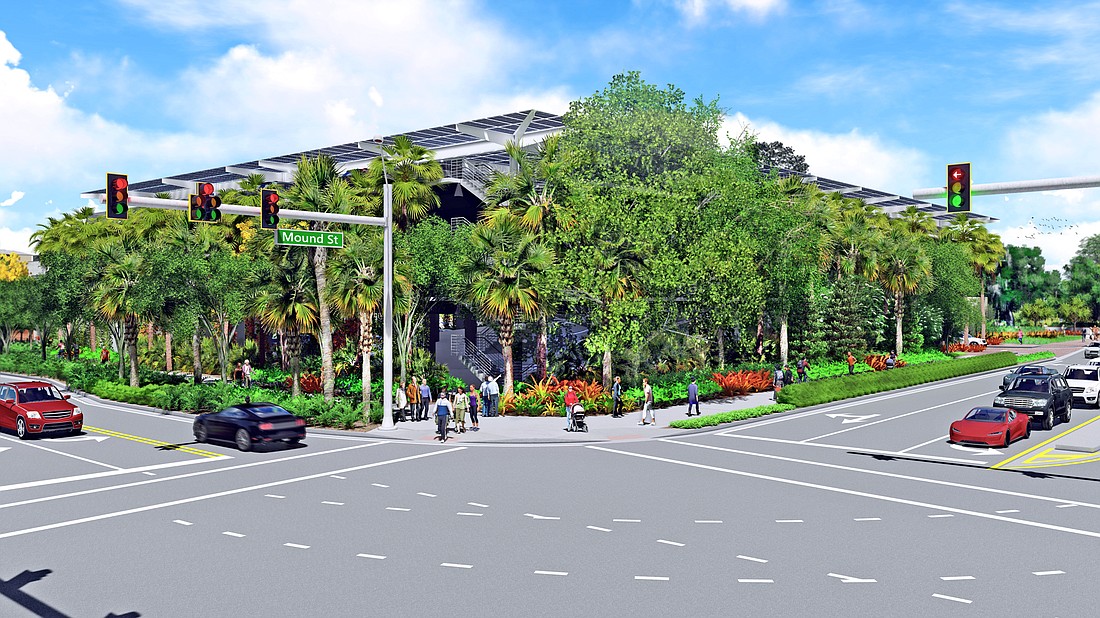- July 18, 2025
-
-
Loading

Loading

For more than three years, a proposal to redevelop the Marie Selby Botanical Gardens campus has been a constant source of controversy even as the plans have gone through multiple iterations.
On Monday, the city could begin to provide some resolution to a long-simmering debate over the bayfront property.
Representatives for Selby Gardens will appear before the City Commission at its Dec. 7 meeting to discuss the latest master plan proposal for the 14.7-acre site at 1534 Mound St. Selby hopes to win the city’s approval to begin the first part of a three-phase renovation project.
Plans for phase one include a four-story, 450-space parking garage, a ground-floor accessory restaurant open during the gardens’ hours of operations and a 28,600-square-foot structure serving as a welcome center and plant research building.
Although the agenda item will only consider a portion of the application — Selby Gardens is asking for a zoning text amendment that could facilitate the future approval of a site plan for the project — it’s a key step to gauge the commission’s opinion of the revised master plan. In November 2019, after a series of public hearings, the City Commission voted 3-2 to reject Selby’s proposed comprehensive plan amendment designed to achieve a similar outcome. That decision caused the botanical garden to revise its proposal.
Selby officials have emphasized the significance of the revisions incorporated into the new master plan, but many aspects of the debate surrounding the project remain unchanged since last year. Outspoken neighborhood critics of the proposal remain convinced it is inappropriate for its surroundings.
Selby officials continue to believe their plan is reasonable and necessary to ensure the long-term sustainability of the botanical garden. City staff and the city Planning Board recommended approval of the revised master plan — but that was true for the original proposal, too.
Still, Selby officials believe the latest proposal represents a meaningful concession that responds to resident concerns related to scale, traffic and noise. The revisions have swayed at least one city official who opposed the original plan: Planning Board member Patrick Gannon, who endorsed the 2020 plan after voting against it in 2019.
“I do find the Marie Selby Botanical Gardens have made significant changes that have addressed the concerns that were raised a year ago,” Gannon said at a September meeting.
Another change: Two of the city commissioners who voted against the initial proposal, Willie Shaw and Shelli Freeland Eddie, are no longer in office. Their successors, Kyle Scott Battie and Erik Arroyo, were critical of the commission’s handling of the Selby Gardens project during their campaigns.
At an August forum hosted by the Greater Sarasota Chamber of Commerce, Arroyo spoke positively about the revised plans.
“Selby was great with talking with the city, with making concessions,” Arroyo said. “… If you look at the modified plan, after they have listened to the people — the restaurant is now on the first floor, it is limited to the gardens’ hours, it is contained. They addressed traffic. Noise is being addressed. When you start by being a good neighbor that way, I think that flourishes into a good project.”
Some residents surrounding the project site continue to argue the changes are inadequate and that the project would be problematic if built out. At the September Planning Board meetings, speakers once again voiced concerns about traffic, noise and events at the Selby property.
“They say it’s a huge compromise,” said Bob Bernstein, the president of the Bay Point Park neighborhood association, in a previous interview with the Sarasota Observer. “That’s what their perception of it is. We don’t see it in any shape or form as a huge compromise.”
Selby Gardens President and CEO Jennifer Rominiecki said the organization has continued to make efforts to engage with its neighbors, including recently hosting a demonstration of a new sound mitigation system installed at the property. Despite any sustained opposition, Rominiecki said Selby believed it had done everything it could to respond to the community feedback it received while also addressing organizational needs.
As a result, regardless of the outcome, Monday’s vote could provide a sense of finality for Selby’s master plan initiatives.
“We are here showing you the best application we can offer,” Rominiecki said at the Planning Board meeting.